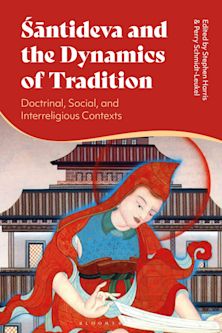- Home
- ACADEMIC
- Philosophy
- Philosophy of Religion
- Kierkegaard on God’s Will and Human Freedom
Kierkegaard on God’s Will and Human Freedom
An Upbuilding Antinomy
Kierkegaard on God’s Will and Human Freedom
An Upbuilding Antinomy
This product is usually dispatched within 2-4 weeks
- Delivery and returns info
-
Flat rate of $10.00 for shipping anywhere in Australia
You must sign in to add this item to your wishlist. Please sign in or create an account
Description
Søren Kierkegaard's authorship exhibits two different trajectories concerning the relation of responsible human agency to sovereign divine agency: one trajectory stresses free human striving, while the other trajectory emphasizes the dominance of divine agency. The first theme led to the view of Kierkegaard as the champion of autonomous existential “leaps,” while the second led to the construal of Kierkegaard as a devout Lutheran who trusted absolutely in God's gracious governance. Lee C. Barrett argues that Kierkegaard, influenced by Kant's critique of metaphysics, did not attempt to integrate human and divine agencies in any speculative theory. Instead, Kierkegaard deploys them to encourage different passions and dispositions that can be integrated in a coherent human life, making use of literary strategies to foster the different passions and dispositions that are associated with the themes of human responsibility and divine governance. Kierkegaard on God's Will and Human Freedom: An Upbuilding Antinomy offers an incisive account of what makes Kierkegaard's conception of theology as a matter of edification rather than speculation so distinctive and enduringly worthwhile.
Table of Contents
Acknowledgements
Sigla for Kierkegaard's Works
Introduction: Kierkegaard and the Tensive Virtues of Resting in God's Governance and Striving for Eternal Happiness
Chapter One: Kierkegaard's Contentious Philosophical Background
Chapter Two: Kierkegaard's Tensive Theological Background
Chapter Three: Kierkegaard and the Later Grace/Free-Will Debate
Chapter Four: Kierkegaard's Unconventional Practice of Theology
Chapter Five: Active Leaping and Gracious Receiving in Philosophical Fragments
Chapter Six: Concluding Unscientific Postscript and the Truth and Untruth of Subjectivity
Chapter Seven: The Upbuilding Discourses and the Art of Being Nothing while Being Something
Chapter Eight: Preparing for Communion and the Impossibility of Preparing for Communion
Chapter Nine: Authorial Intentions and Divine Governance
Chapter Ten: Repentance Interrupted by Birds, Lilies, and Little Ludvig
Conclusion: The Conceptual Antinomy Becomes a Passional Antinomy
Bibliography
About the Author
Product details
| Published | 11 Dec 2023 |
|---|---|
| Format | Hardback |
| Edition | 1st |
| Extent | 224 |
| ISBN | 9781666914924 |
| Imprint | Lexington Books |
| Dimensions | 239 x 159 mm |
| Series | New Kierkegaard Research |
| Publisher | Bloomsbury Publishing |
About the contributors
Reviews
-
Kierkegaard on God's Will and Human Freedom is a masterful exploration of one of Kierkegaard's central theological concerns. The book's latter half primarily justifies the thesis, rather than advancing it, and this reflects Barrett's thoroughness and focus. His scholarship is meticulous and his interpretations are insightful, making this book a valuable resource for Kierkegaard scholars and those interested in the interrelation between divine sovereignty and human agency.
© Toronto Journal of Theology
-
Kierkegaard notoriously resists easy categorization when it comes to philosophical and theological doctrines. This is especially the case for understanding the relationship of divine will and human freedom. As Barrett explains so well in his new book, Kierkegaard stresses the singular importance of God's grace and also the radical value of individual responsibility. Making sense of this striking tension is the task that Barrett undertakes. Impressively, though, he does not attempt to offer an interpretation whereby Kierkegaard could be located on some systematic chart mapping the libertarians, compatibilists, and determinists. Instead, Barrett leans hard into Kant's influence on Kierkegaard and suggests that a better way of interpreting the complicated authorship is by appreciating the "upbuilding" dynamic in play. Hence, Barrett's goal is not to present an argument for a specific Kierkegaardian theological position, but to invite readers to develop the virtues of "responsible gratitude" and "grateful responsibility" by reading Kierkegaard. In a rigorous and existentially viable account, Barrett's analysis is both convincing and inspiring. Highly recommended. Advanced undergraduates through faculty.
Choice Reviews
-
If you understand how Kierkegaard navigates the problem of grace and freedom, there is a sense in which you understand his approach to Christian writing. On this subject, there is no better guide than Lee C. Barrett. This book situates Kierkegaard's treatment of the will against the backdrop of previous debates and, even more importantly, models how to read him well.
Carl S. Hughes, Texas Lutheran University
-
Investigating Kierkegaard's apparent ambivalence on the classic problem of God's will and human freedom, Barrett reveals Kierkegaard to be a theological thinker of the first rank. Focusing upon Kierkegaard's destabilizing and evocative rhetorical strategies throughout his literature, and employing perspectives from the later Wittgenstein, combined with deep knowledge of Kierkegaard's philosophical and theological historical context (particularly Kant), Barrett convincingly shows how Kierkegaard circumvents the traditional metaphysical conundrums on God's will and human freedom. Instead, Kierkegaard radically resituates the issue by pointing to the contexts of the passional and edifying uses of language about God's will and human freedom that create a “stereoscopic vision,” “an upbuilding antinomy” nurturing, not theoretically but in one's life, strenuous striving as well as utter restful reliance on God. Barrett's fresh, insightful study will be welcomed by anyone concerned with questions surrounding God's will and human freedom, but more broadly by anyone concerned with the very practice and task of theology today.
David J. Gouwens, Brite Divinity School
-
One of our most trustworthy guides into Søren Kierkegaard offers here a thick description of the Dane's struggle with the tensive valorization of divine and human agency. Exhibited in the process is Kierkegaard's rhetorical style of doing theology that privileges practical reason over theoretic reason while emphasizing the necessary involvement of certain forms of passion, disposition, and virtue within religious practice. Readers will be grateful for this refreshing portrayal of Kierkegaard as theologian.
Curtis L. Thompson, Thiel College

ONLINE RESOURCES
Bloomsbury Collections
This book is available on Bloomsbury Collections where your library has access.



































